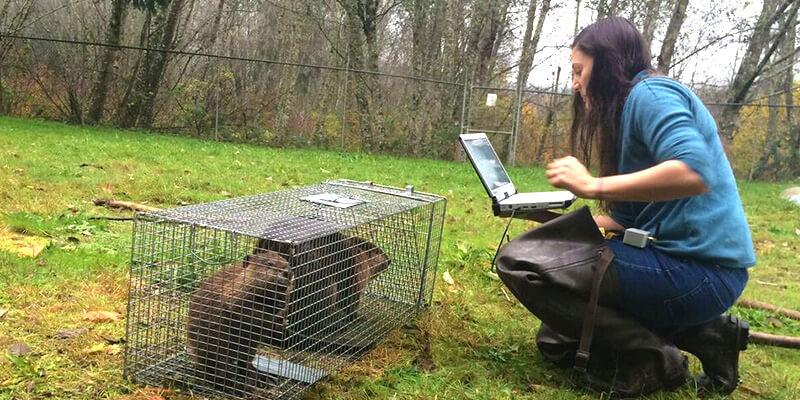Two days after graduation, Molly Alves (WFB ’14) set off on the cross-country road trip of her life. She headed to the state of Washington and her dream job as a wildlife biologist on the Tulalip Tribes Reservation.
Forty-five minutes north of Seattle, the 22,000-acre reservation, where Molly helps to manage wildlife populations, borders Puget Sound to the west and is a short drive to the North Cascade Mountains to the east. The reservation encompasses marine waters, tidelands, fresh water creeks and lakes, wetlands, and forests long relied upon by tribal members for fishing, hunting, and gathering berries, herbs, and cedar to make baskets and clothing.
Molly’s new home in the Pacific Northwest is a far cry from Rhode Island, where she grew up. But, with a passion for animals, at age twelve she began volunteering at the Roger Williams Park Zoo in Providence, RI where she cared for cheetahs, elephants, giraffes, and other African mammals. Through her volunteer work she earned the opportunity to spend ten days in Manitoba, Canada where she studied polar bears and climate change with Polar Bears International.
“Before this experience I thought that I wanted to be a zookeeper,” Molly shares, “but afterwards I knew that being in the field doing research was my calling. I applied to several schools with reputable wildlife programs, but none made me feel more at home than UVM, and ultimately, I don’t think any of the other schools could have given me half of the opportunities that I had as a student in the Rubenstein School.”
A minor in geospatial technologies, valuable internship experiences, study abroad in Tanzania, and practical wildlife and leadership skills gained as member and president of the UVM Wildlife and Fisheries Society (an official chapter of The Wildlife Society) more than qualified Molly for the job with the Tulalip Tribes. She was thrilled to discover she would be working with another Rubenstein School alum, Mike Sevigny (WFB ’92), wildlife manager for the Tribes.
Molly works for the Tulalip Tribes’ Natural and Cultural Resources Department along with 50 other staff, including Mike and wildlife biologist, Jason Schilling. The wildlife program focuses on game management and climate change mitigation.
Since June 2014, Molly has helped to trap nuisance beavers throughout the greater Seattle area and to relocate them to headwater streams of the Skykomish River in the Mount Baker-Snoqualmie National Forest. Here, the beavers’ dam building activities turn restorative. As nature’s engineers, the beavers help to store freshwater, combat low summer flows, temper peak winter flows, decrease erosion, increase channel complexity and riparian zone width, and create rearing habitat for wild salmon, a subsistence resource for many tribal members.
Molly feeds and cares for captured beaver families maintained at the Tulalip Fish Hatchery before moving them up river. She experiments with attaching radio transmitters to beavers to track their activities, and she will soon use her GIS skills to map and measure the amount of surface water being stored by beavers at successful relocation sites.
In the winter, Molly assists with trapping, radio-collaring, and tracking cow elk in the Skagit Valley, home to the North Cascades elk herd. The Tribes’ goal is to increase elk population numbers to preserve and enhance hunting opportunities for tribal members. Molly manages the GPS collar data and maps elk movement to determine if hunting pressure is forcing elk to cross major roads.
She creates interpretive maps for several wildlife projects, surveys estuarine birds for a restoration project in the Qwuloolt Estuary, and helps conduct aerial surveys for mountain goats in the North Cascades. She is writing a collaborative management plan between the Tribes and the USDA Forest Service to manage huckleberry, a culturally important food for tribal members, on the national forest.
Molly credits her Rubenstein School advisor and professor Jed Murdoch with most influencing her career path.
“From the time I took his first-year Wildlife Behavior course to his role as advisor of the Wildlife and Fisheries Society student club, Jed provided invaluable knowledge to succeed in class and to go above and beyond outside the classroom to enhance my chances of employment after graduation,” acknowledges Molly. “Through my involvement with the club, I learned how to process a deer, band a bird, use radio telemetry, and how to step up and be a leader. These skills helped me to get internships throughout my time at UVM, which in turn, gave me a better chance of employment after graduation.”
Molly is considering Master’s degree research through the University of Washington in conjunction with her on-the-job experimentation attaching radio transmitters to beavers. She is interested in studying the effects of predators on beaver retention at release sites.
She lives in North Seattle and has explored the Pacific Northwest, pottery and soap making, beer brewing, and container gardening. She has volunteered with Washington Conservation Voters, who work to elect environmentally conscious politicians in Washington State, and the Washington Environmental Council, a nonprofit that advocates for solving the state’s most pressing environmental challenges. She remains involved with The Wildlife Society and attends regional conferences.
